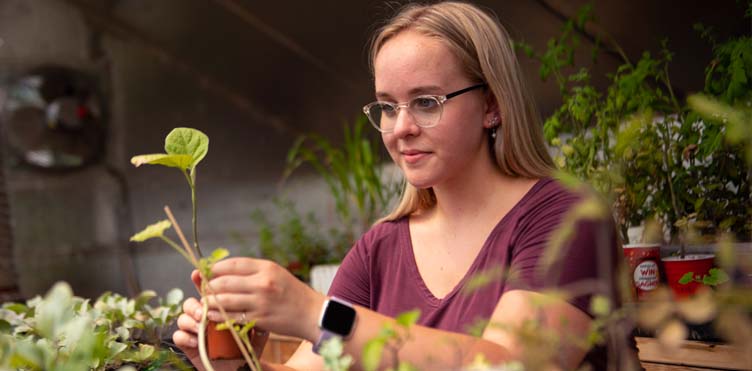ExperienceUNB – Work Integrated Learning

Work integrated learning opportunities can be embedded in programs or courses (curricular) or run outside of regular program or coursework (co-curricular). You can become involved in many different types of work integrated learning (WIL) and can take advantage of support such as the ExperienceUNB learning portal and the Catalyst program.
Business, industry, and organizations can help students enter the world of work and prepare for the future by partnering with UNB to offer different forms of WIL.
ExperienceUNB
ExperienceUNB is UNB’s experiential learning portal. All UNB students can access ExperienceUNB with a UNB login. This platform lists experiential learning opportunities and tracks hours and progress.
Catalyst
Catalyst is a flagship offering in UNB’s work-integrated learning opportunity catalogue that provides students with consulting-style WIL. In Catalyst, students on internship placements tackle specific challenges identified by New Brunswick businesses.
Catalyst starts with a business or management course where students learn the concepts and technological tools of business consulting. During their course work, they develop specific solutions based on their employer-partner's project with assistance from course instructors and professional mentors, including IBM and the McKenna Institute.
Once the course is complete, the student interns work on their employer-partner’s project: a paid internship placement for three months. Students and employers report during the placements, posting evaluations during the progress. A final step - the student’s reflections and the employer’s final report - completes the cycle.
Work integrated learning (WIL)
Curricular work integrated learning
Curricular WIL opportunities are embedded in program or course design and involve employer or industry engagement.
Co-operative education
Paid workplace experience in a setting related to student’s field of study. Typically undertaken in alternating work terms and study terms.
Internship
Discipline-specific, supervised, structured work experience or practice placement. Can be paid, unpaid, and/or for academic credit.
Practicum/Clinical placement
Work experience supervised by an experienced registered or licensed professional, required for professional licensure or certification.
Simulation/Case-based learning
Using cases, problems, or inquiries to place events in a context that promotes authentic learning. Usually does not involve an external partner.
Applied research
Research conducted by a student with guidance from faculty in an academic, industry, or community setting. May be conducted independently or as a course project.
Project-based learning
Activities intended to find solutions to real world problems, culminating in a concrete end product. May or may not involve an external partner.
Co-curricular work integrated learning
Co-curricular WIL activities are not embedded in course or program design. They may or may not be program-related.
- Competitions
- Conferences
- Job shadowing
- Showcases
- Summer or part-time jobs
- Teaching apprenticeships
Previous ExperienceUNB opportunities
Elizabeth Vickers: Promoting good health in the community
Experiential education is a fundamental part of nursing education at UNB, and nursing students are always contributing to good health and well-being throughout their degree.
Elizabeth Vickers completed several opportunities, her first being a clinical placement at a local nursing home. She then completed a second clinical placement that paired two nursing students with a prenatal couple to provide support and education.
During her third year, Elizabeth visited a multicultural centre multiple times each week to provide care and education. She and her peers also held a weekly flu shot clinic for about 500 people, and taught a health topic to a newcomer English class.
In her fourth year, Elizabeth worked at the Dr. Everett Chalmers Hospital, and finished her degree with a preceptorship, being mentored by a nursing professional.
Thomas Gautreau & Brilliant Labs: Developing sustainable communities
Brilliant Labs is a non-profit that supports the inclusion of a hands-on, creative, innovative, and entrepreneurial atmosphere in classrooms and curricula. They provide access to technology and programming to inspire a future of sustainable growth and entrepreneurialism.
Thomas Gautreau, a computer science student, completed a co-op term working as a project manager at Brilliant Labs to improve waste collection practices at institutions. Thomas worked with students from St. Malachy’s Memorial High School on creating sensors to monitor the fill and weight levels of collection containers and developing a mobile application for collecting that data.
The system is then able to notify collection services only when collection is necessary, creating a much more environmentally and economically sustainable collection system.
3D Planeta: Opportunities for innovation
3D Planeta creates industry-leading 3D earth-observation technology software to analyze changes on our planet that connect to their key areas of situational intelligence: earth exploration, emergency response and defense and security.
Aishwarya Yewle, Swathy Parmanandan and Saeed Saryazdi Zadeh all completed experiential learning opportunities at 3D Planeta. All three students worked on 2metre, a platform helping retail and service businesses address the obstacles of COVID-19, including maintaining safety for customers and meeting contact tracing requirements.
Aishwarya and Swathy took on roles as digital marketing interns, designing and implementing creative marketing campaigns, raising awareness of 2metre and generating analytics to measure effectiveness.
Saeed worked as a software engineer, contributing to Concierge, the 2metre app allowing customers to manage their waitlist and customer tracking, among other projects.
